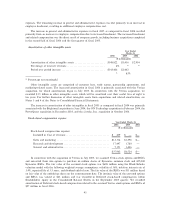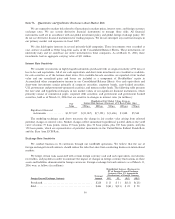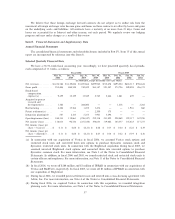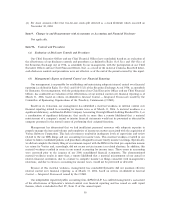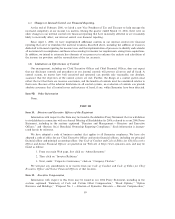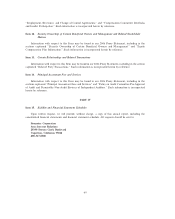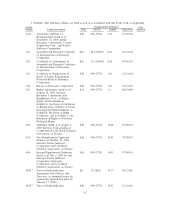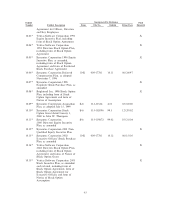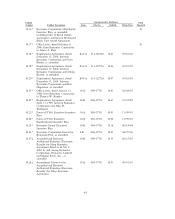Symantec 2006 Annual Report Download - page 61
Download and view the complete annual report
Please find page 61 of the 2006 Symantec annual report below. You can navigate through the pages in the report by either clicking on the pages listed below, or by using the keyword search tool below to find specific information within the annual report.after September 15, 2006. Earlier adoption is permitted, provided the company has not yet issued financial
statements, including for interim periods, for that fiscal year. We do not expect the adoption of SFAS No. 155
to have a material impact on our consolidated financial position, results of operations, or cash flows.
In June 2005, the FASB issued FASB Staff Position, or FSP, FAS 143-1, Accounting for Electronic
Equipment Waste Obligations, which provides guidance on the accounting for certain obligations associated
with the Directive on Waste Electrical and Electronic Equipment, or the Directive, which was adopted by the
European Union, or the EU. Under the Directive, the waste management obligation for historical equipment,
defined as products put on the market on or prior to August 13, 2005, remains with the commercial user until
the equipment is replaced. FSP FAS 143-1 is required to be applied to the later of the first fiscal period ending
after June 8, 2005 or the date of the Directive's adoption into law by the applicable EU member countries in
which we have significant operations. We are currently evaluating the impact of FSP FAS 143-1 on our
financial position and results of operations. The effects will depend on the respective laws adopted by the EU
member countries.
In May 2005, the FASB issued SFAS No. 154, Accounting Changes and Error Corrections, which
replaces APB No. 20, Accounting Changes, and SFAS No. 3, Reporting Accounting Changes in Interim
Financial Statements Ì An Amendment of APB Opinion No. 28. SFAS No. 154 provides guidance on
accounting for and reporting changes in accounting principle and error corrections. SFAS No. 154 requires
that changes in accounting principle be applied retrospectively to prior period financial statements and is
effective for fiscal years beginning after December 15, 2005. When adopted and if used, SFAS No. 154 would
have a material impact on our consolidated financial position, results of operations, or cash flows.
In December 2004, the FASB issued SFAS No. 123R, Share-Based Payment, which requires companies
to measure and recognize compensation expense for all stock-based payments at fair value. SFAS No. 123R is
effective for annual periods beginning after June 15, 2005 and, thus, will be effective for us beginning with the
first quarter of fiscal 2007. Generally, the approach in SFAS No. 123R is similar to the approach described in
SFAS No. 123. However, SFAS No. 123R requires all share-based payments to employees, including grants
of employee stock options and purchases under employee stock purchase plans, to be recognized in the
Consolidated Statements of Income based on their fair values. Pro forma disclosure of fair value recognition
will no longer be an alternative. See Stock-Based Compensation in Summary of Significant Accounting
Policies for information related to the pro forma effects on our reported net income and net income per share
when applying the fair value recognition provisions of the previous SFAS No. 123 to stock-based employee
compensation. On April 1, 2006, we adopted SFAS No. 123R using the modified prospective method. We
expect the adoption of SFAS No. 123R to have a material impact on our consolidated financial position and
results of operations.
In December 2004, the FASB issued SFAS No. 153, Exchanges of Nonmonetary Assets Ì An
Amendment of APB Opinion No. 29, Accounting for Nonmonetary Transactions. SFAS No. 153 eliminates
the exception from fair value measurement for nonmonetary exchanges of similar productive assets in
paragraph 21(b) of APB Opinion No. 29, Accounting for Nonmonetary Transactions, and replaces it with an
exception for exchanges that do not have commercial substance. SFAS No. 153 specifies that a nonmonetary
exchange has commercial substance if the future cash flows of the entity are expected to change significantly
as a result of the exchange. SFAS No. 153 is effective for fiscal periods beginning after June 15, 2005. The
adoption of SFAS No. 153 did not have a material impact on our consolidated financial position, results of
operations, or cash flow.
In December 2004, the FASB issued FSP FAS 109-1, Application of FASB Statement No. 109,
""Accounting for Income Taxes,'' to the Tax Deduction on Qualified Production Activities Provided by the
American Jobs Creation Act of 2004. The American Jobs Creation Act introduces a special tax deduction on
qualified production activities. FSP FAS 109-1 clarifies that this tax deduction should be accounted for as a
special deduction in accordance with SFAS No. 109. FSP FAS 109-1 did not have a material impact on our
consolidated financial position, results of operations, or cash flows.
55


